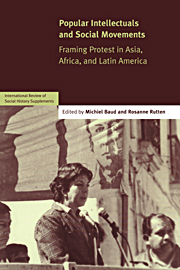Book contents
- Frontmatter
- Contents
- List of Contributors
- Introduction
- Framing, Transnational Diffusion, and African-American Intellectuals in the Land of Gandhi
- Indigenous Communists and Urban Intellectuals in Cayambe, Ecuador (1926–1944)
- Reforming Mysticism: Sindhi Separatist Intellectuals in Pakistan
- Unemployed Intellectuals in the Sahara: The Teshumara Nationalist Movement and the Revolutions in Tuareg Society
- Between Sovereignty and Culture: Who is an Indigenous Intellectual in Colombia?
- Critics and Experts, Activists and Academics: Intellectuals in the Fight for Social and Ecological Justice in the Narmada Valley, India
- Framing Jihad: Intramovement Framing Contests and al-Qaeda's Struggle for Sacred Authority
- Popular Publics: Street Protest and Plaza Preachers in Caracas
- Concluding Remarks: Framing Protest in Asia, Africa, and Latin America
Indigenous Communists and Urban Intellectuals in Cayambe, Ecuador (1926–1944)
Published online by Cambridge University Press: 04 August 2010
- Frontmatter
- Contents
- List of Contributors
- Introduction
- Framing, Transnational Diffusion, and African-American Intellectuals in the Land of Gandhi
- Indigenous Communists and Urban Intellectuals in Cayambe, Ecuador (1926–1944)
- Reforming Mysticism: Sindhi Separatist Intellectuals in Pakistan
- Unemployed Intellectuals in the Sahara: The Teshumara Nationalist Movement and the Revolutions in Tuareg Society
- Between Sovereignty and Culture: Who is an Indigenous Intellectual in Colombia?
- Critics and Experts, Activists and Academics: Intellectuals in the Fight for Social and Ecological Justice in the Narmada Valley, India
- Framing Jihad: Intramovement Framing Contests and al-Qaeda's Struggle for Sacred Authority
- Popular Publics: Street Protest and Plaza Preachers in Caracas
- Concluding Remarks: Framing Protest in Asia, Africa, and Latin America
Summary
Summary: This case study provides an example of how people from two fundamentally different cultures (one rural, indigenous, Kichua-speaking and peasant, and the other urban, white, Spanish-speaking and professional) overcame their differences to struggle together to fight social injustices. Rather than relating to each other on a seemingly unequal basis, the activists recognized their common interests in fighting against the imposition of an international capitalist system on Ecuador's agrarian economy. Emerging out of that context, activists framed collective interests, identities, ideas, and demands as they worked together to realize common goals. Their actions challenge commonly held assumptions that leftist activists did not understand indigenous struggles, or that indigenous peoples remained distant from the goals of leftist political parties. Rather, it points to how the two struggles became intimately intertwined. In the process, it complicates traditional understandings of the role of “popular intellectuals”, and how they interact with other activists, the dominant culture, and the state.
In May 1926, Jesus Gualavisi, an indigenous leader representing the Sindicato de Trabajadores Campesinos de Cayambe (Peasant Workers’ Syndicate of Cayambe), traveled to the Ecuadorian highland capital city of Quito to participate as a delegate in the founding of the Partido Socialists Ecuatoriano (PSE, Ecuadorian Socialist Party). At the first session of the congress, Gualavisi proposed “that the assembly salute all peasants in the Republic, indicating to them that the Party would work intensely on their behalf”.
- Type
- Chapter
- Information
- Popular Intellectuals and Social MovementsFraming Protest in Asia, Africa, and Latin America, pp. 41 - 64Publisher: Cambridge University PressPrint publication year: 2005



